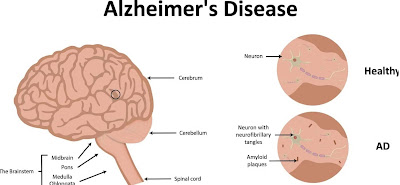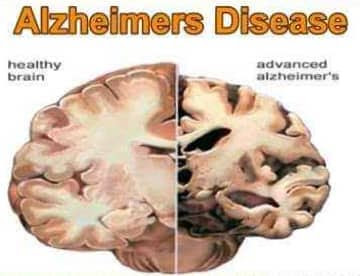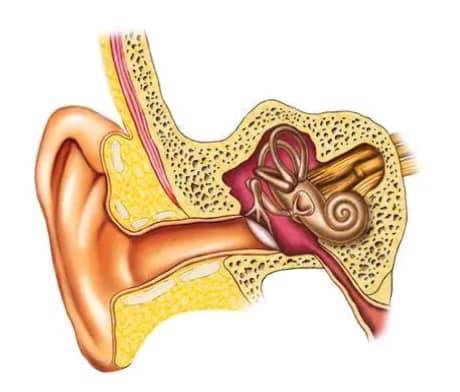 |
| Alzheimer's disease |
Alzheimer's sickness is a neurological disease wherein thoughts of cellular dying end in reminiscence loss and cognitive decline. A neurodegenerative shape of dementia, the disease begins mildly and worsens through the years.
Fast Facts About Alzheimer's Disease
Here are some important points about Alzheimer's disease.
Alzheimer's disease is the maximum commonplace form of dementia. The time period "dementia" describes the lack of mental ability associated with the slow loss of life of mind cells. An expected 5. three million individuals of all ages have Alzheimer's disorder. An estimated 5.1 million are above the age of 65 and approximately 200,000 are below the age of 65. In the United States, he gets this disease every 67 seconds. it is the most effective leading reason for the demise of some of the top ten within the USA that cannot be prevented, treated, or delayed. nearly -thirds of USA citizens with Alzheimer's ailment are girls. One in three of her older adults dies of Alzheimer's disease or other dementias. Alzheimer's and other dementias cost the country $226 billion annually. In 2014, healthcare costs for caregivers with Alzheimer's disease and dementia increased by an additional $9.7 billion. As the US population ages, Alzheimer's disease is becoming a leading cause of death. Causes of Alzheimer's disease Alzheimer's disease, like all forms of dementia, is caused by the death of brain cells. It is a neurodegenerative disease that implies the progressive death of brain cells over time. Alzheimer's disease reduces the overall size of the brain. There are fewer and fewer nerve cells and connections in the tissue. Nerve cells (neurons) in the brain. In Alzheimer's disease, there are microscopic 'plaques' and 'tangles' between and within brain cells. Although they cannot be observed or tested in living brains affected by Alzheimer's disease, an autopsy/necropsy always reveals small inclusions of nerve tissue called plaques or tangles. For most people with Alzheimer's disease (late-onset Alzheimer's disease), symptoms first appear in their mid-60s. Symptoms of Alzheimer's disease start to appear from the age of 30 to the mid-60s. Age is the best risk factor for Alzheimer's disease. It usually affects people over the age of sixty-five. From this age onward, the risk of developing Alzheimer's disease doubles every 5 years. One in six people over the age of eighty has dementia, most of whom have Alzheimer's disease. The most common early symptom of Alzheimer's disease is an inability to remember newly learned information. Like other parts of our body, our brain changes as we age. Most of us eventually find that our thinking slows down and we sometimes have trouble remembering things. Alzheimer's disease most normally affects older humans, however, it may also affect people in their 30s or 40s. when Alzheimer's ailment develops in human beings under the age of 65, it's far called early-onset (juvenile-onset) Alzheimer's disease. a totally small wide variety of people with Alzheimer's disease have early onset. Alzheimer's disease symptoms 1. Decreased ability to absorb and retain new information. example: repetitive questions or conversations misplacing personal items 2. Impaired reasoning, complex tasks, and judgment: Lack of understanding of security risks unable to manage finances 3. Changes in personality or behavior, such as: unusual mood swings, including agitation; decreased interest, motivation, or initiative. apathy; social withdrawal loss of empathy Compulsive, obsessive, or socially unacceptable behavior. memory impairment that interferes with each day's existence. ... demanding situations in planning or fixing troubles. ... issue completing familiar obligations. ... Confusion of time and region. ... The hassle of information visible photographs and spatial relationships. ... New issues with words whilst speaking and writing. The question "Does aluminum really cause Alzheimer's disease? " Should we formulate it more precisely as " Are Alzheimer's ads motivating and even showing causal ads? It is virtually impossible to quantify events, durations, and propagandizes at the individual level, much less establish a causal link between a single detail: aluminum. On the one hand, it is a complex and apparently multifactorial disease, including Alzheimer's disease (AD). It just lacks one clear fact. Alternatively, the epidemiologic guide to the relationship between overall exposure to aluminum and the relative risk of developing Alzheimer's disease is complex. This answer We define a few fundamental facts about aluminum in terms of its degree and variety of organic publicity. We summarize conclusions from a recent meta-evaluation and systematic cross-sectional assessment of the affiliation between aluminum and Alzheimer's disease. "What explains Alzheimer's disease and its genetic basis? Is Alzheimer's disease inherited? Why isn't it always inherited? Why are genetic tests controversial? " A2A Alzheimer's disease (AD) is a degenerative brain disease that causes dementia, characterized by progressive memory loss, loss of judgment, and loss of function. It usually occurs in people over the age of 65 (late onset), but rarely in early adulthood (early onset). Early-onset AD is most closely associated with inheritance patterns. Late-onset AD has been reported in some members of several families, but the pattern of inheritance has not been clearly established. Genetic testing can therefore be controversial. Heritability is not closely associated with any form of the disease. Genes, not the actual disease, carry the risk. This means that you can inherit the genes associated with early-onset Alzheimer's disease without developing Alzheimer's disease. Knowing you have the gene can lead to unnecessary anxiety. Do most people get Alzheimer's disease? We are not dying from what would have killed us a generation ago. Cancer and heart disease remain major killers, but advances in medicine are helping more people live into their 80s. My mother had a premature injury. He was successfully treated with radiation and never fully recovered from cancer. Fast forward, she is 87 and dying of dementia. Instead of dying in her late 40s or early 50s like a generation ago, she lived to the point of losing her mind. He has not recovered yet. I have read that more people are dying from second and third cancers because first-line cancer treatments are working. Alzheimer's disease and dementia deaths are the results of drug advances in other areas.
Age is for Alzheimer's disease
Causes of Alzheimer
Early signs and symptoms of Alzheimer's disease
symptoms of Alzheimer

.jpg)
.jpg)



